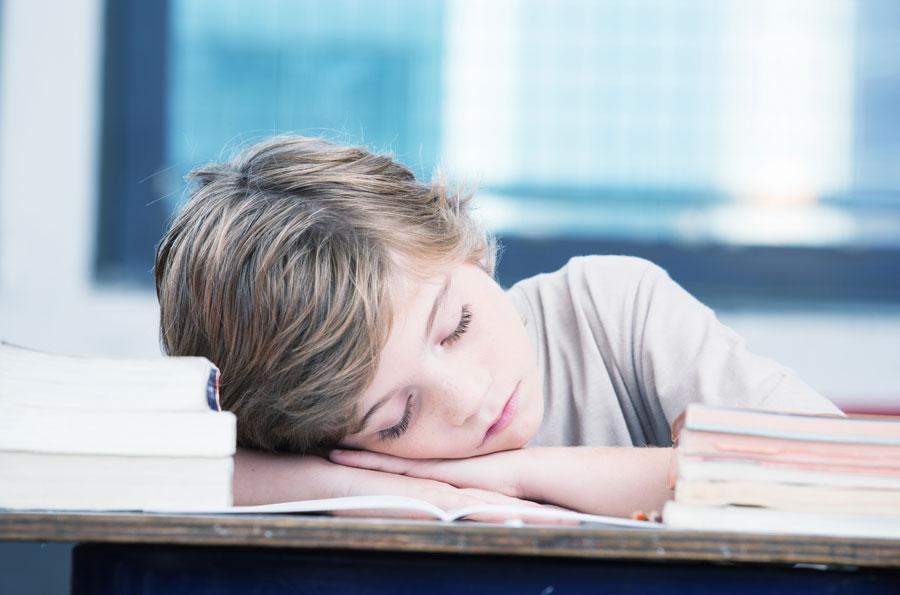How many hours of sleep do teenagers need?


Insufficient sleep is associated with stress, anxiety, behavior and attention problems and learning difficulties. Sleep deprivation is also associated with struggles with obesity, depression, diabetes, accidents and injuries. Our teens need our help making wise decisions and taking better care of themselves.
How Much Sleep do Teens Need?
The American Academy of Sleep Medicine recommends at least 8-10 hours of sleep for ages 13-18. Early high school start times,mornings, after-school activities, homework, night owl tendencies and social activities all vie for time with sleep and they often win.
To make matters worse, after puberty there is a biological shift in an adolescent’s internal clock. Teens experience a natural shift of about 2 hours in their circadian rhythms which makes it difficult for them to fall asleep as early as they used to. If a teenager used to fall asleep at 9:00 PM, she will now not be able to fall asleep until about 11:00 PM.
Sleep deprivation will cause your teenager to be moody and irritable, may interfere with academic performance and may cause him to engage in more risk-taking behaviors such as drinking alcohol and driving too fast.
If teens are not getting enough sleep, parents need to intervene. Sometimes our children need help making wise decisions and focusing on their health and well-being. Below are 4 reasons why sufficient sleep is essential for healthy teenagers and their development.
Frontal Lobe Development
Teenagers are going through a second developmental stage of cognitive maturation and need more sleep as the frontal lobes of their brains are developing. Without sufficient sleep teenagers’ thinking is impaired. Without enough sleep, teens will struggle as decision processes are delayed, memory is decreased, reaction time is slowed, creativity is hindered and attention spans are shortened.
Physical Growth Spurts
Teens are experiencing physical growth spurts and need quality amounts of restorative sleep to regulate hormones, build strong muscles and empower immune systems. Because of this growth and development, teens need more sleep than adults to feel alert and well rested. Growth may be negatively affected from lack of sleep over the long term.
Growth hormones are normally released during sleep. Lack of sleep can also affect other hormones. Studies show that sleep deprivation is linked to obesity and diabetes.

Depression
Depression is affecting many of our teenagers. Social pressures, self esteem issues, and academic stress all contribute to the problem. Studies are showing that lack of sleep negatively impacts emotional development and may increase risks for mental health disorders like depression and anxiety among teenagers. Sufficient sleep can help protect teens from depression.
Risky Behaviors and Self Harm
More than 70% of teens are averaging less than 8 hours of sleep. Sleep deprived teens are more likely to exhibit risky behaviors associated with poor decision-making.
Researchers have found a relationship between lack of sleep and increased incidences of self harm and higher rates of suicide among teenagers. Teen years are filled with major changes: body changes, emotional changes and cognitive changes. Emotions such as fear, doubt, confusion and stress may feel overwhelming. Suicide is the third leading cause of death in young people ages 15 to 24. The CDC reports that boys are 4 times more likely to die from suicide than girls. And girls are more likely to try to commit suicide than boys.

Intervene and Help Your Teen Get Enough Sleep
If your teenager is struggling, it is time to intervene. Protect your adolescent’s emotional and physical health by giving them guidance on how to improve their sleep. Help your teenager get quality sleep by designing a Sleep-Friendly Bedroom. Encourage your teen to limit screen time in the late evening to help melatonin production. Talk with your adolescent about a healthy, responsible bedtime routine. Encourage an attitude of thankfulness and mindfulness by recommending your teen keep a gratitude journal each night. Your influence in the area of sleep can help your teen feel better, achieve more and be happier in the process.



